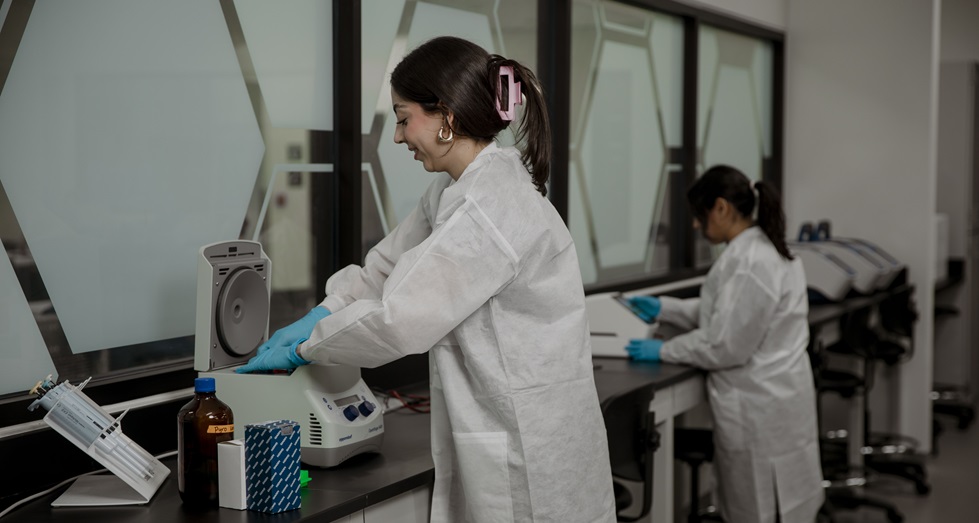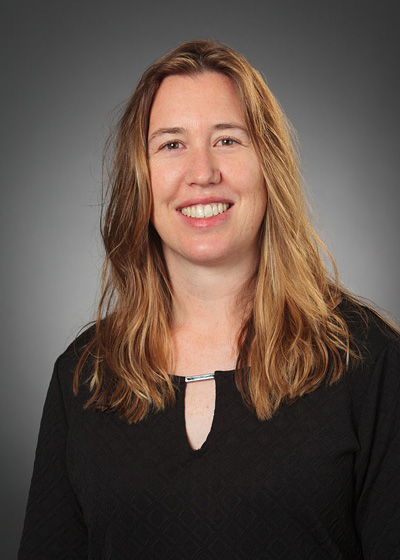DNA Day: The Human Genome Project and Advancements in Biotechnology

Today, April 25, we are celebrating DNA Day - talking about one of the most significant advancements in the history of DNA - the completion of the Human Genome Project and how it has shaped the future of biotechnology.
To help us break down this achievement in science and health care, we spoke with Ericka Hendrix, Ph.D., MB(ASCP)CM, Program Director and Associate Professor in the Master of Science in Molecular Pathology program in the School of Health Professions.
The Human Genome Project
The National Human Genome Research Institute describes The Human Genome Project (HGP) as one of the greatest scientific feats in history - a global scientific effort with a goal to generate the first sequence of the human genome.
“The project was a voyage of biological discovery led by an international group of researchers looking to comprehensively study all of the DNA (known as a genome) of a select set of organisms,” according to the NIH. “Launched in October 1990 and completed in April 2003, the Human Genome Project’s signature accomplishment – generating the first sequence of the human genome – provided fundamental information about the human blueprint, which has since accelerated the study of human biology and improved the practice of medicine.”
Fast facts from the NIH:
- In 2003, the Human Genome Project produced a genome sequence that accounted for over 90% of the human genome. It was as close to complete as the technologies for sequencing DNA allowed at the time.
- Concerns and questions about sequencing the human genome helped to usher in a greater emphasis on ethics in biomedical research.
- The project was atypical for biomedical research, in that the researchers’ work was driven by a desire to explore an unknown part of the biological world — as opposed to first formulating a theory or hypothesis.
- The sequencing of the human genome involved researchers from 20 separate universities and research centers across the United States, United Kingdom, France, Germany, Japan and China.

Ericka Hendrix, Ph.D.
Dr. Hendrix explains that this project was a unique change in research in that people began sharing data, starting a more open dialogue among researchers. This change, coupled with other scientific advancements and a global pandemic, have completely revolutionized the landscape of biotechnology today.
“Now, we can sequence a human genome in just a few days in one lab,” says Hendrix. “This new tech is called next-generation sequencing that quickly and accurately provides more personalized medicine for patients. It’s realistic and doable to now sequence whole genomes to detect certain diseases.”
The Future of Biotechnology
Hendrix talks about the key areas that have been most impacted by the project and will only continue to shape biotechnology.
Treating inherited genetic diseases: Hendrix explains that DNA codes for how certain proteins are expressed in our bodies. She says this can be used to interpret risk assessment for certain diseases and recognize active diseases, but also allows care teams to treat patients appropriately.
“Right now, we can do a genetic cancer panel,” Hendrix says. “Molecular oncology is probably the second fastest growing part of our field today.”
Real-Time PCR: Polymerase Chain Reaction is commonly used to measure gene expression and is how scientists first detected COVID-19.
“It has given us the ability to detect microorganisms or viruses really quickly, and because of coronavirus testing, the area of rapid molecular testing for infectious diseases took off,” says Hendrix. “In the future, I think there will be a greater ability to provide the general public accessibility to rapid testing in a lot of different areas.”
Other relevant areas of advancement according to Hendrix include:
- Identifying new pathogens and linking those to diseases
- Gene therapy
- Noninvasive prenatal testing and liquid biopsy testing for cancer
As far as her predictions for what’s to come, Hendrix says that in the clinical space, there is still much more to learn regarding associations with genetic variations and diseases. She even mentions that there is a current push for sequencing every newborn baby, despite ethical questions raised with the topic.
A New Age
Ultimately, while Hendrix notes the accomplishment that the Human Genome Project was and still is today, she credits the COVID-19 pandemic for changing the perception and landscape of her field for generations to come.
“The COVID-19 pandemic really caused everyone to embrace what we do,” she says. “I train students to become molecular scientists, and we need to be able to have scientists that can pivot quickly, so that’s really our focus and our passion."
The goal, Hendrix says, is $1,000 genome. While science and technology isn’t there yet, the future is bright for this burgeoning field in health care.
Related Stories
TTUHSC Receives $1 Million Gift from Amarillo National Bank to Expand and Enhance Pediatric Care in the Panhandle
TTUHSC School of Medicine leaders accepted a $1 million philanthropic gift from Amarillo National Bank on Tuesday (Feb. 10), marking a transformational investment in pediatric care for the Texas Panhandle.
Texas Tech University Health Sciences Center Permian Basin Announces Pediatric Residency Program Gift
TTUHSC Permian Basin, along with the Permian Strategic Partnership and the Scharbauer Foundation, Feb. 5 announced a gift that will fund a new pediatric residency.
The Ph.D. Programs that Shape Health Care
The Graduate School of Biomedical Sciences Ph.D. programs at TTUHSC provide the foundation, mentorship and research opportunities you need to pursue groundbreaking work.
Recent Stories
National Academy of Inventors Names TTUHSC Faculty Senior Members
The National Academy of Inventors (NAI) has designated two current and one former TTUHSC faculty researchers as Senior Members.
The John Wayne Cancer Foundation Surgical Oncology Fellowship Program at Texas Tech University Health Sciences Center Announced
TTUHSC is collaborating with the John Wayne Cancer Foundation and has established the Big Cure Endowment, which supports the university’s efforts to reduce cancer incidence and increase survivability of people in rural and underserved areas.
TTUHSC Receives $1 Million Gift from Amarillo National Bank to Expand and Enhance Pediatric Care in the Panhandle
TTUHSC School of Medicine leaders accepted a $1 million philanthropic gift from Amarillo National Bank on Tuesday (Feb. 10), marking a transformational investment in pediatric care for the Texas Panhandle.
